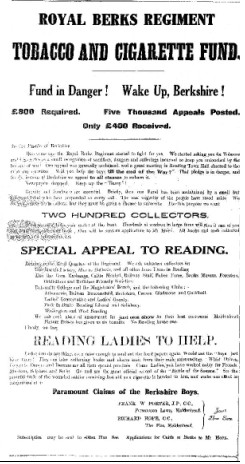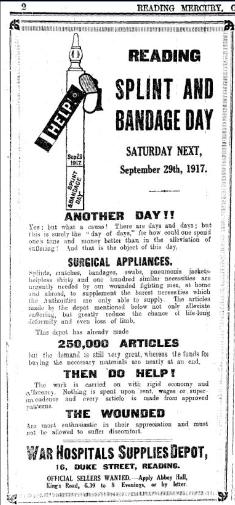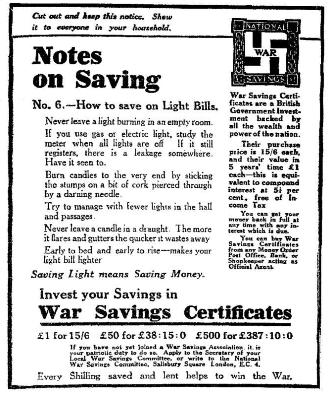
|
Arborfield
|
|
Memories
Related sites:
In 1918 there was a reminder of the truly awful conditions of life in the Trenches - see the appeal for 'Anti-Vermin Garments' from Beatrix Siminds of Farley Hill.
|
Fund-Raising - a persistent need From the start, there were notices, editorials and adverts urging people to raise funds and sometimes materials. The first was headed ‘Prince of Wales National Relief Fund’, as mentioned in the article on the start of the war. On December 18th 1915, a Notice appeared: British Prisoners of War The first edition of January 1916 reported that the collection had raised well over £300. Later that month, there were extensive reports from British Prisoners of War in Germany, though the men’s names and the locations were all replaced by ‘______’. The 25th March issue stated that fund-raising by the Church of England Men's Society for Chaplains’ Huts at the Front had collected £234.
Fund in Danger! Wake Up, Berkshire! £800 Required. Five Thousand Appeals Posted. Only £400 Received. To the People of Berkshire, Our appeal was generally acclaimed, and a great meeting in Reading Town Hall cheered to the echo our question: "Will you help the boys till the end of the War?" That pledge is in danger, and for the honour of Berkshire we appeal to all classes to redeem it. Newspapers dropped. Keep up the "Baccy"! For more on the fund, click here.
Notices in newspapers in Autumn 1916 appealed for supplies of Sphagnum Moss, which was found to be ideal for dressing wounds. Later, there were regular articles on how well the local collection schemes were working, as in this article from March 10th 1917: "FINCHAMPSTEAD:
On 28th October 1916, there was a notice appealing for funding a ‘Berkshire Room’ at the Star and Garter Home in Richmond. The ‘Star and Garter Day’ was eventually set for January 13th 1917. A concert was to be held to raise funds for the ‘Berkshire Room’. The newspaper pointed out that the ‘Star and Garter’ had originally been a ‘Victorian hostelry’. The street collection alone was later reported to have raised £200. On 19th May 1917, it was reported: ‘STAR AND GARTER HOME’ THE QUEEN’S APPRECIATION ‘In connection with the recent successful effort on behalf of the Star and Garter Home at Richmond, Viscountess Reading has received a letter from Sir Edward Wallington, Private Secretary to H. M. The Queen, saying that Her Majesty is greatly interested to hear that the £2,000 required to endow a ‘Berkshire Room’ at the Star and Garter Home has been collected, together with a further sum of £250 for the equipment of the room. ‘Her Majesty further expresses to Lady Reading, and through her to Mrs. Benyon, the Rev. Percy Harrison and the ladies and gentlemen associated with them, her warmest appreciation of their splendid efforts in collecting so large a sum in Berkshire for this deserving institution.’
The rival newspaper the 'Reading Standard' had first reported on the Home much earlier, in an illustrated article on August 28th 1915: 'The Council of the Auctioneers and Estate Agents' Institute has inaugurated a scheme that will meet with universal approval. They propose to establish a permanent home for disabled soldiers and sailors, and to this end they are purchasing the famous Star and Garter Hotel, Richmond, which occupies a site unrivalled from the standpoint of health, while the view from the house and gardens is famous throughout the world. 'The necessary alterations, equipment and maintenance of the institution will be undertaken by the British Red Cross Society, and the annexe will be open in about three months.'
September
29th 1917 was declared to be Click here to see the full text. The same issue carried a slightly different kind of appeal: 'HOSPITALITY FOR AUSTRALIAN SOLDIERS'
From August to mid-November 1918, local newspapers carried a series of adverts on War Savings Certificates. At this time, the 'swastika' symbol would have been uncontroversial, but 15 years later, it was hijacked by Hitler to become altogether more sinister. Even today, it shocks.
On 16th November 1918, immediately after the Armistice was signed, organisers from the Y.M.C.A. lost no time in announcing: AN APPEAL FROM THE FRONT CHEER THE BOYS WHO HAVE CHEERED YOU URGENTLY NEEDED 1,000 BOOKS, Travel, Adventure, Poetry, Good Fiction 10,000 Magazines MUSIC, SONGS, MUSICAL INSTRUMENTS, GAMES, PUZZLES. The Boys who have won the Victory need these things NOW. DON’T LET THEM DOWN. The evenings are long, dull and cheerless till they return to Blighty. Send ALL YOU CAN to us immediately, To be sent out at once. (Miss) F. E. OAKESHOTT, )
On March 1st 1919, it was reported: Royal Berks Prisoners of War Convalescent Home for Twenty Patients. The Berkshire Prisoners of War Committee, responsible for sending food parcels, bread and biscuit parcels, and clothing, to the prisoners of war, reported the numbers imprisoned on Armistice Day at 1,400, up from 250 at the end of 1917. By March 1919, almost all had been repatriated.
|
| |
|
Any Feedback or comments on this website? Please e-mail the webmaster |


